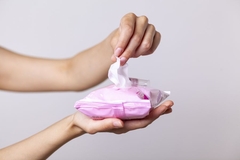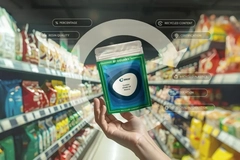Aquapak unveils dissolvable wet wipe material to cut plastic pollution

Aquapak has developed a dissolvable, nonwoven wipe material using its proprietary Hydropol polymer. The technology offers a potential solution to the growing environmental issues caused by disposable hygiene products such as wet wipes and sanitary pads. It replaces traditional plastics with a water-soluble, non-toxic alternative that fully dissolves in domestic wastewater systems.
The wipes dissolve after flushing without forming microplastics or contributing to sewer blockages. This addresses concerns around fatbergs — large masses of solid waste in sewers formed mainly from wet wipes and grease.
The technology also offers a plastic-free alternative to sanitary products, which are often composed of up to 90% plastic and take centuries to degrade.

“The material is being used to develop next-generation hygiene products such as wet wipes, which will not release microplastics or block sewers. This solves one of the biggest consumer pollution problems facing us today,” says Mark Lapping, CEO at Aquapak.
Cut from a different cloth
Hydropol’s functionality stems from its ability to dissolve entirely upon contact with water. When flushed, the fibers swell but do not fragment, eventually biodegrading without attracting fats, oils, or greases — key contributors to sewer fatbergs.
Aquapak partnered with Innovatec Microfibre Technology and Kindcloth, a company that holds a patent on dissolvable wipe technology, to produce this material at scale. The collaboration resulted in a single-step process for converting Hydropol pellets into melt-blown nonwoven fibers.
.jpg) The Hydropol technology has been adapted for a broader range of disposable products.“We have worked closely with leading nonwoven material manufacturers to develop an environmentally friendly alternative which does not rely on conventional plastic for its functionality and is set to revolutionise the nonwovens sector,” says Lapping.
The Hydropol technology has been adapted for a broader range of disposable products.“We have worked closely with leading nonwoven material manufacturers to develop an environmentally friendly alternative which does not rely on conventional plastic for its functionality and is set to revolutionise the nonwovens sector,” says Lapping.
The final wipes are manufactured with Kindcloth-approved lotions and dissolve in seconds after flushing. The material has been certified as flushable, biodegradable in freshwater, and home compostable.
Beyond wet wipes, the Hydropol technology has been adapted for a broader range of disposable products, including makeup removers, face masks, insect repellent wipes, and industrial wipes.
Aquapak is also working with Planera on a flushable sanitary pad called Fluus, which uses a Hydropol coating instead of conventional plastic.
The coating dissolves safely when disposed of, broadening the material’s applications in the personal care sector.
Proscribing pollutants
Aquapak’s initiative comes as the UK bans the sale and supply of wet wipes that contain plastic. According to the government’s research, an average of 20 wet wipes were found per 100 meters of beaches surveyed across the UK from 2015 to 2020.
“The UK ban on wet wipes is part of a broader trend toward reducing plastic waste,” Chiara Lai, a member of Obelis’ Regulatory and Innovation Department, previously told Personal Care Insights.
At the end of last year, Northern Ireland joined the UK and notified the World Trade Organization that it would also ban the sale of plastic-containing wet wipes.
According to Lai, the public showed “overwhelming” support, but the ban has since spurred a wave of innovation to replace the product with more environmentally conscious alternatives. The final wipes dissolve in seconds after flushing.
The final wipes dissolve in seconds after flushing.
Amcor and Fedrigoni recently unveiled a flexible wet wipe application that aims to increase wet wipes’ recyclability. The complete pack is designed for recycling in the PE recycling stream.
UK wellness brand Wype also launched a gel formulation infused with aloe vera and chamomile extract that turns traditional toilet paper into wet wipes. The launch followed a survey where the company found that 51% of individuals express dissatisfaction with the cleanliness of traditional toilet paper, and 76% acknowledge the environmental impact caused by “flushable” toilet wipes.












